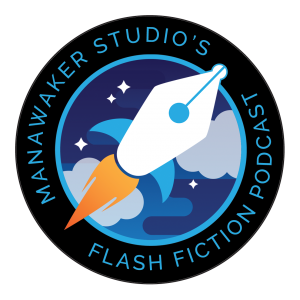Submit to Flash Fiction Podcast

Submissions are open for Manawaker Studio’s Flash Fiction Podcast. We are currently reading for Season 11, which will run from Feb to Dec 2026, and include approximately 48 stories.
The Flash Fiction Podcast is just what it sounds like. Most weeks, a new short-short story is put out in podcast form by Manawaker Studio, produced and hosted by CB Droege. Want to listen first? Do so in any podcast app or over on the Manawaker Patreon which supports the show.
THE STORIES
Length: The ideal length is around 800 – 1100 words, but stories as short as 500 or as long as 1500 may be considered.
Content: Flash Fiction Podcast focuses on stories which are clever and thoughtful. When reading submissions we’re searching for stories which use the small word-count wisely to tell big stories in small spaces. We love settings that hint at greater world-building without leaving us feeling lost; We like to see characters which feel whole and have real agency despite the small glimpse we get into their lives; and we appreciate stories that have a recognizable plot with a classic arc. A story doesn’t have to tick all of these boxes to make it into MSFFP, but if it doesn’t hit any of them, it’s not a good story for us. All genres will be considered, but the editor’s proclivities lean toward the speculative, the fantastic, the futuristic, and the weird.
Structure: The stories are to be read aloud. Stories that can’t be understood if you can’t see the formatting wont work. If your story contains made-up words (or words which might be particularly foreign to an English-speaking, Ohio born narrator) include a pronunciation guide. We may add a content warning if the story contains certain sensitive topics, giving us one is also nice, but not required. Gratuitous vulgar words may be beeped, garbled, or replaced if appropriate.
Our ‘always pass’ list (these things will probably get your story rejected even if it’s otherwise amazing):
- Erotica or gore-horror. Lovey stuff and scary stuff can find a home with us, but this podcast is intended to be accessible to all ages, so excessive descriptions of bodily fluids, viscera, or genitalia will be rejected.
- Gratuitous harm: On-the-page violence toward children or animals is out, as is graphic rape.
- Gratuitous hate: Stories which demonstrate hate (different from the occasional hateful character) are not interesting to us. Neither are politics which advocate for striping away people’s rights.
- Jokes: We like light-hearted stories, and we enjoy humor, but a story which is mostly a set-up for a punchline or pun, like something you might use in a stand-up routine, will not make it.
- Misidentification twists: If being able to see the characters from the beginning would have ruined the story (or some similar ‘trick’ on the audience) it’ll be a hard sell here. Especially “You thought the narrator was a human but actually they are an alien!” (or visa-versa)
- Work generated by algorithm: absolutely not.
SUBMITTING
Format: The preference is for rtf files and standard manuscript format, but doc, docx, pdf, and txt are all fine too. Or, if it’s short enough, you can just paste it into the sub manager. If we can read it, we will read it. you won’t be rejected just because your format isn’t perfect.
Multiple Subs: Up to three works at a time. Please make separate entries in the sub manager, not all in one document.
Reprints: Welcome. Let us know where it was published previously, so we can credit them in the podcast. It’s the submitter’s responsibility to ensure they have the rights to their work before submitting. Previously published also includes print and online publication. Yes, we only publish in audio, but we still need to know if it’s been published previously in a different form.
Simultaneous submissions: Okay. Withdraw the submission in the submission manager right away if the non-exclusive audio rights to your work are no longer available at any point.
Rights requested: As with all Manawaker projects, we will request only non-exclusive publishing rights after acceptance. At no point will Manawaker studio require any sort of exclusive rights to any story and the original creator will retain all copyrights.
Translations: Please include a copy of the contract showing that you have the rights to translate and distribute the other author’s work.
 Compensation: For the use of a previously unpublished work: a token payment of 10$US. Reprints: 3$US. Contributors may choose to have their payment sent to Manawaker’s favorite charity Child’s Play, which focuses on supplying video games and toys to kids in hospitals.
Compensation: For the use of a previously unpublished work: a token payment of 10$US. Reprints: 3$US. Contributors may choose to have their payment sent to Manawaker’s favorite charity Child’s Play, which focuses on supplying video games and toys to kids in hospitals.
Submission Fee: Never.
Contract: If your work is accepted, you’ll be asked to agree to this contract. Feel free to review it in advance.
Method: Manawaker Studio Submissions Manager. Make sure to select the correct project!
Cover letter: No need for a cover letter or any other additional info.
Response times: A couple weeks to a few months. We try not to let anything sit with us longer than 90 days, but life and other projects can get in the way. You can use the submission manager to check the status of your submission at any time.
Deadline: None. This is an ongoing project.
FAQ
Here CB answers some of the questions he tends to get about the project. Please check here before asking:
Really, no exclusivity in the contract? Even for previously unpublished work?
We pay extra for first publication rights, as is standard, but no, we don’t require any form of exclusivity in any Manawaker project. If we paid for first-publication rights, then contributors must at least wait until the episode is published before selling the rights again (or they can request to change to a reprint payment). We do ask nicely for contributors to wait a year after the episode before they start actively shopping the story around again, but it’s not in the contract because we don’t want any contributors to be forced to turn down a good sale of a reprint work. If your story was just featured on MSFFP, and the next day you see a reprint call that would be absolutely perfect for it, send it.
What kind of ads might be next to my story on the podcast?
None. MSFFP doesn’t run ads. It’s wholly supported by volunteer subscriptions on the Patreon. If you’d like to help support the Podcasts, and all other Manawaker projects, join up. ;D
How big is the audience for the podcast?
That’s a hard number to know with any certainty, but from my best guess, looking at the numbers on all the places that offer me numbers, it looks like around two-thousand folks listen regularly to the podcast.
What’s the deal with the charity option? Should I feel bad if I don’t donate my compensation?
The option to donate your compensation to charity actually came out of the 100 Word Project, another publication of Manawaker Studio. That project began as a group of friends who wanted to write little stories together, and when the end of the first year came along, and we decided we wanted to also publish them, and that I would do it through Manawaker Studio. That meant I wanted to pay the drabblers for their stories at my normal token rate. However, because we were all friends, and some of the payments were as little as 1$, several of the drabblers said that they’d rather their payment went as a donation to Manawaker Studio’s operating costs. However, Manawaker is not set-up, legally, to accept donations, so that was not a good solution. Instead I suggested that I could pay their compensation to a charity instead of to them, and those drabblers agreed that that was a good option. Once I had that system in place for the 100 Word Project, it only made sense that it be an option for anyone who contributed to Manawaker Studios projects, so it’s here as an option for FFP contributors as well.
There is no expectation that you use the option, and no one will judge you for getting paid for your work. I want you to get paid, and I like sending payments to my contributors, even if I can’t pay pro rates yet (someday!). The option is just there for folks who have a personal, tax, or technical reason why they cannot, should not, or don’t wanna accept payment directly from Manawaker.
What is covered by the “alterations” mentioned in the contract?
So, the contract says that “Production decisions, including alterations to the Work for the purpose of translation to audio format or changes to text that would be understood as proofreading and copyediting, are at the Producer’s discretion.”
This is not for substantial changes to the text. If I needed that, I would certainly go over it with the contributor, and, in general, I have a policy of only accepting stories that I don’t want to make substantial changes to. In the rare case that I want to alter something, it will never be a condition of acceptance, and the author will always have final say on the changes.
Due to the nature of the publication, I don’t actually copyedit anything (since no one will ever see the text), but when I record the performance of the piece there may be some in-the-moment changes resulting from the performance. Often very small changes to word order or other small shifts due to how the piece sounds aloud, mostly these changes occur in dialog. As example: I might drop speaker tags, if they feel redundant alongside performed character voices, or add sighs or laughter to the performance of a line instead of reading out the description. I don’t usually make decisions on things like that until I’m recording the performance, so I can’t go over them with the contributor, but they are never changes to the substance of the text, just to the performance of it. Also, as mentioned above: Gratuitous vulgar words may be beeped, garbled, or replaced if appropriate. This line in the contract covers these small changes.
Do you use any generative algorithms in the production of the podcast? How does that affect copyrights?
I never use AI in my performances. It’s all me and my normal audio editing tools. However, I make the cover art for the podcast myself and I do sometimes use elements of generated visual art, usually only to save time making small changes to existing public domain art (like removing backgrounds or changing colors) if I can’t find just what I want. Also, the current state of genAI makes it impossible to always avoid using AI derived art, even if I try. It’s floating around out there, the filters aren’t perfect, and I’m sure I occasionally use some by accident. There was a period back in Season 8 when the generative visual art tools were first starting to get impressive and I used a lot of fully generated images for my covers, but by the end of the season, I’d already moved away from that, and now I try to use algorithms as sparingly as possible. If a contributor ever wants me to avoid prompting any ‘AI’ tools in creating their cover art, I will honor that request. Just let me know when you respond to the contract.
I’m not worried about copyrights on the covers. All the art and fonts I use come from the public domain, and I seek no copyright on the finished products.
Any other questions should be sent to contact@manawaker.com.
